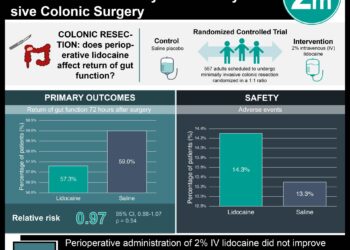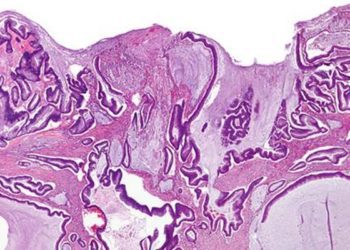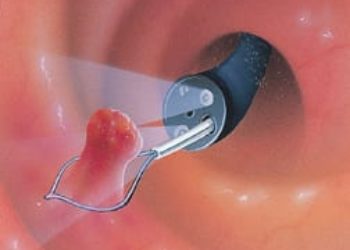Prospective analysis supports current colorectal cancer screening guidelines
Image: PD
1. Colonoscopy and sigmoidoscopy were associated with lower incidences of distal colorectal cancer and death from colorectal cancer.
2. Screening colonoscopy was associated with reduced mortality from proximal colon cancer while sigmoidoscopy was not.
3. Cancer diagnosed within 5 years after colonoscopy was often molecularly distinct from other colon cancers.
Evidence Rating Level: 2 (Good)
Study Rundown: This study supports the utility of lower endoscopy for screening for colorectal cancer. Both colonoscopy and sigmoidoscopy were associated with lower incidences of and death from colorectal cancer. However, colonoscopy was associated with reduced mortality from proximal colon cancer while sigmoidoscopy was not. The observation that cancer diagnosed within 5 years from colonoscopy is more likely to possess distinct molecular phenotypes is consistent with previous literature and suggests that this occurs in individuals at higher risk for colon cancer. These cancers may grow more quickly or be harder to detect via endoscopic evaluation. The overall magnitude of this study is compelling, though pooling data may have introduced an element of bias. Overall, the results support current colorectal cancer screening guidelines and for first time, provide evidence supporting these practices over an extended period of time.
Click to read the study, published today in NEJM
Click to read an accompanying editorial in NEJM
Background Reading: Screening for colorectal cancer
In-Depth [prospective cohort analysis]: This study examined the long term effects of lower endoscopy on the incidence of and mortality from colorectal cancer. The authors pooled data from two prospective cohort studies: the Nurses’ Health Study and the Health Professionals Follow-up Study. These two studies included a total of 88,902 men and women followed over 22 years and yielded a total of 1,738,396 person-years of follow-up. Data from these cohorts was collected via questionnaires, review of medical records, and pathology reports. In the combined cohort, endoscopy was associated with a significantly lower incidence of colorectal cancer (multivariate hazard ratio, 0.57, 95% CI, 0.45-0.72). Reduced incidence of colorectal cancer was observed in patients who had undergone polypectomy, had a negative sigmoidoscopy, or had a negative colonoscopy. Death from colorectal cancer was lower in patients who had undergone colonoscopy (HR, 0.32; 95% CI, 0.24-0.45) and sigmoidoscopy (HR, 0.59; 95% CI, 0.45-0.76) than those who had not. However, a reduction in mortality from proximal colon cancer was only observed in patients who underwent colonoscopy (HR, 0.47; 95% CI, 0.29-0.76). Additionally, colorectal cancers diagnosed within 5 years of colonoscopy were more likely to possess the distinct molecular features of CpG island methylator phenotype (CIMP) or microsatellite instability.
By Akira Shishido, MD and Adrienne Cheung
© 2013 2minutemedicine.com. All rights reserved. No works may be reproduced without expressed written consent from 2minutemedicine.com. Disclaimer: We present factual information directly from peer reviewed medical journals. No post should be construed as medical advice and is not intended as such by the authors, editors, staff or by 2minutemedicine.com. PLEASE SEE A HEALTHCARE PROVIDER IN YOUR AREA IF YOU SEEK MEDICAL ADVICE OF ANY SORT.







